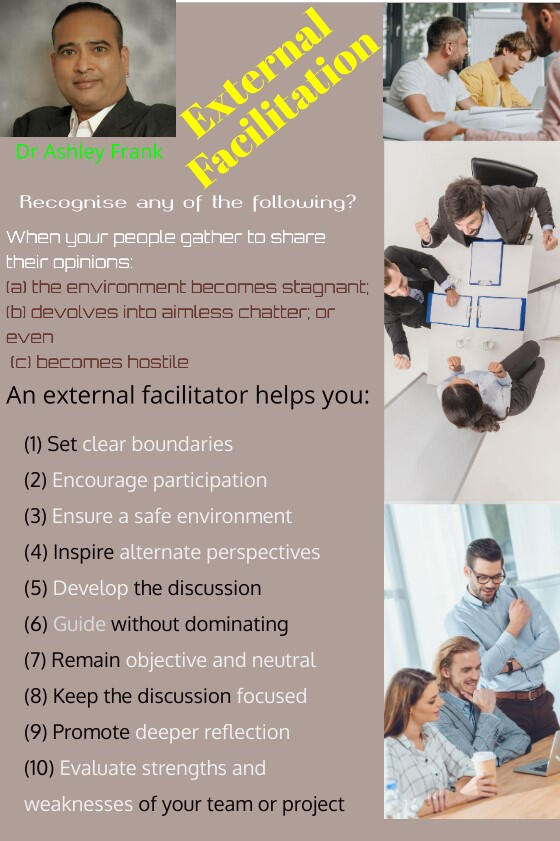External Facilitation
We are all feeling it: The pressure to build smart, innovative organisations. The biggest question leaders ask, in this effort, is how they can craft their organisation into a learning one?
A facilitator is someone who creates a safe and involving environment where people can identify and solve problems, plan together, make collaborative decisions, resolve their own conflicts and self-manage as responsible adults. Not all managers are facilitators becuase there are specific facilitative mind and skill sets that are essential ingredients to making real a "learning organization".
We’ve all been in meetings facilitated by someone “outside” the group or even the organisation. But how does this help, and is it worth the expense? Several benefits are cited by clients and facilitators alike. They primary ones are
+ Neutrality;
+ Experience; and
+ Focus
The facilitator’s job is to support everyone to do their best thinking. They create an environment where everyone is encouraged to participate, understand one another’s point of view and share responsibility. In doing so, a group facilitator helps members look for elegant solutions and build sustainable agreements.
The Main Roles of a Facilitator
Training and facilitating are two different activities. They require some of the same skills, and some different ones. A trainer is often a content expert, while a facilitator is a process expert. A trainer uses lectures, conducts demonstrations, supervises skill practice, and corrects the learners’ mistakes. A meeting facilitator leads discussions and helps participants learn from their own experiences and shared information. The trainer might lead a discussion about course content; a facilitator will focus more on the process of a discussion. Facilitation skills training often includes training skills.
FOCUS - ATTENTION - KNOWLEDGE - COMPETENCIES
A Trainer/Instructor focuses on what is discussed – to get the work of the group done. Their attention is devoted to content and task, described by the objective or purpose, and finally the result or outcome.
Trainers are generally subject matter experts. They:
Prepare for instruction;Set the learning environment;Use adult learning principles;Lecture;Conduct discussions;Conduct learning activities;demonstrations, skill practices, etc;
Give feedback to learners;Handle problem learners;Evaluate skill performance; andUse audiovisuals.
A facilitator focuses on how the discussion progresses to hold the group together and foster ownership.
The facilitator is concerned with methods and process, the participation of all and group dynamics.
Facilitators are group dynamics experts. They:
Plan meetings using an agendaSet a productive climate and begin a discussionGet the group to focus on defining and reaching outcomesHelp the group communicate effectivelySupport and encourage participationFoster self-discovery of alternatives and solutionsHelp the group make decisionsHelp select a team leaderHandle disruptive participants effectively excluded from the group
During and after the corona crisis facilitators showed their worth and necessity to the success of on-line meetings, we encourage clients to consider inviting a facilitator into their regular in-person meetings too. Facilitators can bring focus, clarity, fluidity and harmony to a meeting that could save your business time and money in the long run.

A discussion is primarily an exchange of opinions and feelings, and of facts secondarily. Successful discussions include listening to others. Since opinions are neither right nor wrong, your facilitator will encourage everyone to contribute to the discussion. The role of a facilitator is to come to a discussion prepared, knowing what kinds of questions to ask to elicit the desired outcomes.
Learning through discussion takes place when participants are made to think. Your team facilitation discussions will be more successful becuase we do the following:
Step 1: We will set up the discussion by telling the participants the objective of the discussion, what they are going to talk about, and how the discussion will be conducted.
Step 2: We will facilitate the discussion by asking questions and evaluating responses to build to a learning point. We help participants to summarize the main points of the discussion.
Step 3: We have participants share and interpret their reactions to what was discussed by answering specific questions about what happened to themselves and to others during the discussion.
Step 4: We ask participants to identify concepts from the discussion by answering questions crafted to elicit what was learned and the extent to which the meeting objectives were met.
Step 5: We ask participants to apply what was learned during the discussion by answering particular questions designed to help them use and apply the new information learned from the discussion to their own situations.
Although many of our facilitators are technical experts in different aspects of business, during a discussion it is not appropriate for us to play the technical expert role, becuase the content of the discussion is meant to come from the participants. We make sure that we don't offer our unsolicited opinions. Outcomes from a discussion should be the product of the group’s thinking. The facilitator’s fingerprints should not be on the results.
If you as manager aren't able to facilitate a discussion with your staff while staying out of the discussion, its unlikely you will be able to create the space for true collaboration.
Allow us to audit one of your meetings and you will see the difference having an external facilitator has on your ability to harness multiple perspectives and inspire creativity.
